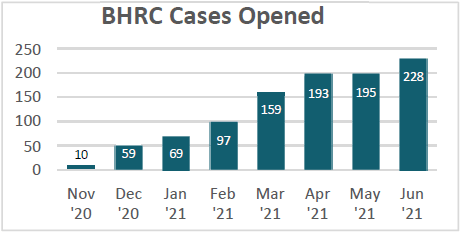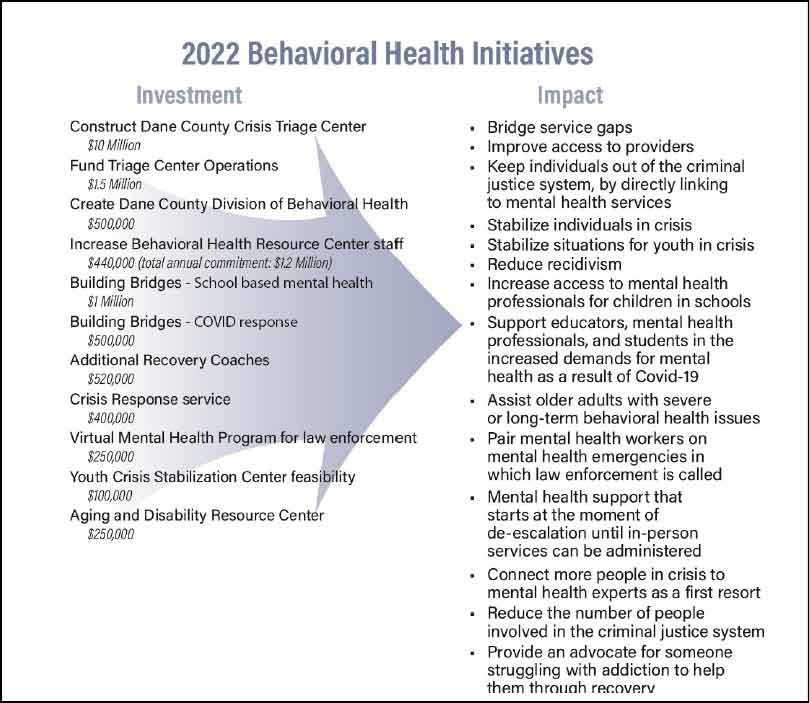
The continuation of the pandemic will continue to strain not only the physical health of far too many in our community but also their emotional well-being. One of the many long-term unknowns from this period of time is what the behavioral health impacts will be for decades to come, especially with our younger generations. Rates of anxiety and depression were on the rise nationally prior to the Covid-19 pandemic. The past 19 months have altered everything we hold dearly - the health of ourselves and loved ones, unanticipated changes to schooling, work, and routine for us and our kids, and for some, economic hardship, job loss, and uncertainty over life basics like food and housing. The disruptions were pervasive, as were the impacts on our mental health and well-being.
 Over the past decade Dane County has bolstered mental health services across our community. Last November we opened the Dane County Behavioral Health Resource Center, a facility that connects people with resources to address the barriers in mental health care and those seeking treatment for substance abuse. In its first seven months, the Center received over 1,000 contacts that resulted in staff making almost two and a half times that number of follow-up calls to bridge service gaps, improving access to behavioral health care. Navigating the complex network of insurance, agencies, service providers, and waitlists is hard for anyone but this team of county mental health professionals are seeing success advocating for individuals and their families. Given increasing workloads, I’m adding $440,000 in this budget for more staff at the Behavioral Health Resource Center. This will bring county government’s annual commitment to this project to over $1.2 million.
Over the past decade Dane County has bolstered mental health services across our community. Last November we opened the Dane County Behavioral Health Resource Center, a facility that connects people with resources to address the barriers in mental health care and those seeking treatment for substance abuse. In its first seven months, the Center received over 1,000 contacts that resulted in staff making almost two and a half times that number of follow-up calls to bridge service gaps, improving access to behavioral health care. Navigating the complex network of insurance, agencies, service providers, and waitlists is hard for anyone but this team of county mental health professionals are seeing success advocating for individuals and their families. Given increasing workloads, I’m adding $440,000 in this budget for more staff at the Behavioral Health Resource Center. This will bring county government’s annual commitment to this project to over $1.2 million.
Our school based mental health teams are in ten Dane County districts, providing critical behavioral health resources in support of over-worked school counselors and mental health professionals. We invest over $1 million annually in county dollars in "Building Bridges." We have spearheaded mental health work in community centers, another point of contact for young people and their families. We've also bolstered mental health services for our seniors thru our Aging and Disability Resource Center. Mental illness can affect anyone. Its impacts on learning, work, and family members are pervasive. It is one of the greatest barriers to happiness and success. This budget, like its predecessors, advances innovative solutions to our community's evolving behavioral health needs. Mental health is one area we can never become complacent.

To reflect the priority this issue must take now and into the future, I am creating a brand- new division of county government to oversee our expanding array of innovative behavioral mental health initiatives. The new Dane County Division of Behavioral Health will become part of our Department of Human Services beginning in 2022. This budget includes over $500,000 in funding for a new director and staff to get the Behavioral Health Division started. It’s important we dedicate the resources necessary to this evolving work and have the capacity to continue the county’s role at coordinating mental and behavioral health services.
One of the primary initiatives of the county’s Behavioral Health Division will be overseeing development of a new Dane County Crisis Triage Center. This is the single largest item in my 2022 capital budget. I’m including $10 million for site acquisition, planning, and development of this one stop facility that will help keep individuals out of the criminal justice system and directly link them with services customized to address the barriers they face. This stabilization center will provide mental health services, keeping people out of jail and in the services suited to address the barriers they face. I’m also dedicating an additional $1.5 million to help meet the service and operational needs when the Triage Center opens. Ours will become among a handful of such crisis centers in the country dedicated to stabilizing individuals and improving outcomes in such a comprehensive manner. Individuals will be able to get help from the crisis center by a referral from community partners, be brought in by law enforcement, or just walking in themselves. This is our most significant initiative to date at improving our community’s behavioral health.
 We know prevention and early intervention works and the “Building Bridges” school based mental health program we created several years ago is an effective template at helping our young people address mental health challenges before they have a chance to manifest into deeper end barriers to success later in life. That’s why I’m allocating another $500,000 next year for additional mental health professionals in schools to help educators and students navigate the unknowns of Covid-19. These dollars will be available to school districts interested in expanding the existing “Building Bridges” model and get more mental health professionals, social workers, and counselors into our schools. My hope is that these American Recovery Program funds can help schools add mental health staffing capacity over the next three years when we know there will be greater demand for this work given the unknowns of the ongoing pandemic. Classrooms this year could be subject to temporary quarantines, stops and starts, and sadly positive cases among students and staff. This budget recognizes the continuing need to partner with schools and support our young people. History books will no doubt talk about this time as being transformational to the mental health of many. We have to make sure our young people - kids who are susceptible to some of the darkest reaches of Covid - have the resources they need to first cope, and then heal from the trauma of this time. This brings total funding I’m making available for “Building Bridges” to over $1.5 million next year.
We know prevention and early intervention works and the “Building Bridges” school based mental health program we created several years ago is an effective template at helping our young people address mental health challenges before they have a chance to manifest into deeper end barriers to success later in life. That’s why I’m allocating another $500,000 next year for additional mental health professionals in schools to help educators and students navigate the unknowns of Covid-19. These dollars will be available to school districts interested in expanding the existing “Building Bridges” model and get more mental health professionals, social workers, and counselors into our schools. My hope is that these American Recovery Program funds can help schools add mental health staffing capacity over the next three years when we know there will be greater demand for this work given the unknowns of the ongoing pandemic. Classrooms this year could be subject to temporary quarantines, stops and starts, and sadly positive cases among students and staff. This budget recognizes the continuing need to partner with schools and support our young people. History books will no doubt talk about this time as being transformational to the mental health of many. We have to make sure our young people - kids who are susceptible to some of the darkest reaches of Covid - have the resources they need to first cope, and then heal from the trauma of this time. This brings total funding I’m making available for “Building Bridges” to over $1.5 million next year.
My budget also recognizes that some of our young people may need more intensive services. I'm taking the first step toward creating a Youth Crisis Stabilization Center here in Dane County. Such a facility will stabilize situations for young people who need access to clinical mental health services in a residential setting. It will provide them a safe, supervised environment to de-escalate from crisis, begin to heal, and learn strategies to help prevent future recurrence. Currently there is only one Youth Crisis Stabilization Center in Wisconsin. The $100,000 included in my budget will explore the feasibility of pursuing one here. This feasibility analysis will help develop cost estimates and consider how such a facility could operate. On the other end of the age spectrum, I’m upping funding for a mental health resource programs for seniors I first created in 2020 by over $58,000. These senior mental health caseworkers work closely with senior focal point managers across the county to assist older adults with severe or long-term behavioral health issues. This program now totals over a quarter million dollars in the county budget.